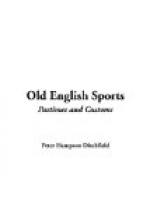[Footnote 5: Shrove-tide and Shrove Tuesday derive their names from the ancient practice of confessing one’s sins on that day. To be shriven, or shrove, means to obtain absolution from one’s sin.]
[Footnote 6: It was practised as late as the end of the last century.]
[Footnote 7: So called from the Gospel of the day, which treats of the feeding of the five thousand.—Cf. Wheatley on Prayer-book.]
[Footnote 8: The caber is a small tree, or beam, heavier at one end than the other. The performer holds this perpendicularly, with the smaller end downwards, and his object is to toss it so as to make it fall on the other end.]
[Footnote 9: A Pleasant Grove of New Fancies, 1637.]
[Footnote 10: Sometimes the May Queen did not consort with morris-dancers, but sat in solitary state under a canopy of boughs.]
[Footnote 11: A Correspondence in Athenaeum, Sept. 20, 1890.]
[Footnote 12: The same story is told of Willes, who is supposed by some cricketers to be the inventor of the modern style of delivery.]
[Footnote 13: The word fair is derived from the ecclesiastical term, feria, a holiday.]
[Footnote 14: Cf. Govett’s King’s Book of Sports, and Tom Brown’s Schooldays, to which I am indebted for the above accurate description of back-sword play.]
[Footnote 15: I am indebted for this description to Mr. W. Andrews’ interesting book on the Curiosities of the Church.]
[Footnote 16: Cf. Annals of Winchcombe and Sudeley, by Mrs. Dent.]
[Footnote 17: Cf. Glossary of Berkshire Words and Phrases, by Major B. Lowsley, R.E.]
[Footnote 18: The custom of bringing in the boar’s head is still preserved at Queen’s College, Oxford. The story is told of a student of the college who was attacked by a wild boar while he was diligently studying Aristotle during a walk near Shotover Hill. His book was his only means of defence, so he thrust the volume down the animal’s throat, exclaiming, “It is Greek!” The boar found Greek very difficult to digest, and died on the spot, and the head was brought home in triumph by the student. Ever since that date, for five hundred years, a boar’s head has graced the college table at Christmas.]
INDEX.
Agape, suggested origin of “Church ales,” 53
Ales, Church, 52, 53, 57
Alfred, laws relating to holidays, 5
All-hallow Eve, 105
Animals to be hunted, 16
April, 36
Archery, 25—31
Ascension Day, 50
Ascham’s accomplishments of English Gentleman, 97
Back-sword play, 81
Baiting bears, bulls, &c., 89
Bale-fires, 50
Ball games, 20, 21, 61—71




